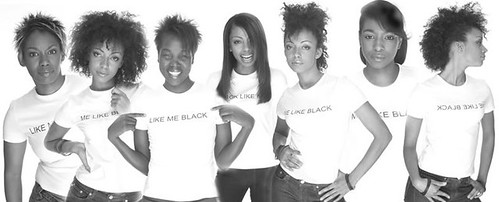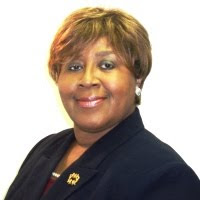Is Black Really Beautiful? [RE-POST]
Say it loud, I’m Black and I’m proud!
Say it loud, I’m Black and I’m proud!
I distinctly remember hearing that James Brown song in the mornings on my way to school and in the afternoons on my way home. That was “back in the day” as the kids say now. I was too young to really understand its significance back then, but I do “get it”now.
Almost forty years later, do Black folk really believe that song or was it just lyrics over a tight beat? If we are truly Black and proud, why in the year 2007 do we continue to have conversations about light skin vs. dark skin and good hair vs. bad hair?
Inarguably, there are realities beyond our control and history that cannot be changed. We can make tremendous change, however, if we would simply stop perpetuating self-hatred, negativity and ignorance. One person at a time; no mass marches, rallies or boycotts required.

BLACK IS BEAUTIFUL - AS LONG AS IT'S TAMABLE By Nicole Sealey
In response to the question, do Black women who wear their hair in its natural state do so for genuine political reasons?, Talitha Coverson, a recent FAMU graduate, said, "In the 1960s and 70s the political statement was defiance and recognition of Black beauty. Today, it does serve as a political statement; however, it is more indirect not necessarily intentional, but by all means the end result is highly political." With some exceptions, prior to and following the 1960s and early 1970s, there really was no such philosophy as "Black is Beautiful." The very concept, in terms of Black and White thought, was in itself an oxymoron. Black was far from beautiful and Black attributes even further. In popular "beauty culture", natural Black hair was and is perceived as an insignia of inferiority.
 The "politics" of Black hair is an extremely controversial subject matter. Black people, for the most part, are as hair-struck as they are color-struck and suffer from as many hair-complexes as they do color-complexes. Black men and women alike have internalized Western notions of beauty, particularly in regards to "good" and "bad" hair. Black males are certainly not exempt from criticism when it comes to Black women's hair. The ways in which Black women desire to -or not to- wear their hair is a direct result of not only centuries of their colonial conditioning, but of Black men's conditioning as well. Essentially, Black men influence beauty culture, particularly Black female hair culture. In general, Black men are mostly attracted to light-skinned, long straight-haired women. Due to Black men's socialized preference, Black women, seeking both approval and love, transform themselves accordingly.
The "politics" of Black hair is an extremely controversial subject matter. Black people, for the most part, are as hair-struck as they are color-struck and suffer from as many hair-complexes as they do color-complexes. Black men and women alike have internalized Western notions of beauty, particularly in regards to "good" and "bad" hair. Black males are certainly not exempt from criticism when it comes to Black women's hair. The ways in which Black women desire to -or not to- wear their hair is a direct result of not only centuries of their colonial conditioning, but of Black men's conditioning as well. Essentially, Black men influence beauty culture, particularly Black female hair culture. In general, Black men are mostly attracted to light-skinned, long straight-haired women. Due to Black men's socialized preference, Black women, seeking both approval and love, transform themselves accordingly.
In response to the question, how do Black men influence the ways in which Black women wear their hair?, Rashad Broomfield, a senior at the University of South Florida, answered "In general, women do their hair to reflect what men want and vice versa." Black women seem to bear the brunt of these racist superficial Eurocentric standards. In Hair Matters: Beauty, Power, and Black Women's Consciousness, author Ingrid Banks notes, "What is deemed desirable is measured against white standards of beauty, which include long and straight hair (usually blonde), that is, hair that is not kinky or nappy." To live up to these standards -or rather limitations- of beauty, Black women, unconsciously enthused, straighten/perm or hot comb their hair. Black women's preoccupation with Eurocentric beauty culture is reflected in, not only the amounts of bleaching products that Black women purchase, but also in the sales of hair straightening merchandise (i.e. African Pride, Dark & Lovely, Just 4 Me, Soft & Beautiful, et cetera).
There is a lot of power in words and greater politics in vocabulary and the meaning of language. The Brand names of the previously mentioned straightening agents suggest, African/Black inadequacy. The Brand name African Pride is a critical paradox. How can one take pride in their culture, yet seek ways in which to abandon and/or undermine it? Dark & Lovely insinuates that if one is in fact "Dark," since Blackness is a characteristic of otherness/ugliness, there is a slight hope that they can be a tad "lovely" by straightening their hair. Just 4 Me is neither for me nor my Black/African sisters because it censures rather than celebrates natural Black hair. Natural Black hair has been and is already Soft and Beautiful. There is no need for chemically false softness or socialized beauty.
These agents reiterate and illustrate a black/white dichotomy wherein white is the standard by which people of color, Black people in particular, are critically and aesthetically assessed. Ayanla D. Byrd and Lori L. Tharps, authors of Hair Story: Untangling the roots of Black hair in America, comments "The pervasiveness of what bell hooks terms th[e] 'dull dish that is mainstream White culture' has succeeded in keeping many people unaware of the… unique culture of Black hair." Although the majority of Black women who have chemically processed hair have from a very young age had their hair chemically "treated," most Black women who chemically "treat" their hair claim that they do so for both "manageability" and "versatility;" however, their argument is misleading because at such young ages one generally is not afforded the opportunity of choice and if one made such a choice it would be reflective of and influenced by their peers. Therefore, they cannot know how manageable and/or versatile their hair, in its natural state, really is. Furthermore, they cannot argue that it is their "personal choice" when in fact they were not given a choice and if so were not cognizant of the choice chosen.
When asked, do Black women who wear their hair in its natural state demonstrate that they are more "conscious" than the average Black woman?, Nyota Lormine, a junior at the University of South Florida, replied "In a way they do, but at the same time there are those sisters that do it for fashion. Some chemically processed sisters are "conscious," but they choose not to take themselves out of that particular prison for "manageability." Nonetheless, the straightening of Black hair does not necessitate nor indicate lower levels of "consciousness." Black people, Black women specifically, must understand the justifications, implications, and ramifications of chemically processing their hair. Historically and inadvertently, hair has been a tool used to justify African otherness, which subsequently warranted enslavement and later disenfranchisement. Due to the above mentioned historical context, natural Black hair is indicative, consciously or unconsciously, of a political/subversive agenda. Black hair is not only an indictment of mainstream beauty mores, but also symbolizes self-confidence. Black women who wear their hair naturally tend to exude higher levels of self-assurance.
When asked, what does wearing your hair natural mean to you?, Heru Holloway, a former FIU student commented, "It is an expression of self. It is also rooted in an acceptance of who I am mentally. Being that standards of beauty are Eurocentric, for me wearing my hair naturally is a conscientious undertaking." Traditionally, Western beauty mores have been utilized to excuse the treatment of Africans by Europeans. Although standards of beauty are such that they exclude African/Black people, being knowledgeable of these artificial and biased standards and recognizing that Black, in its natural state, is, in fact, beautiful allows for a paradigm shift -or dissolution- that includes all people. This very necessary paradigm shift, develops and gains momentum with every kinky, curly, wavy, and nappy natural.
© 2007 VANESSA BYERS
Click here to boost my Technorati ranking! Thanks! 
Enter your email address below to subscribe to Vanessa: Unplugged! Powered by FeedBlitz
Reading blogs at work?
Click here for a suitable escape route. ---> ![]()



















2 comments:
Great article. I started wearing my hair natural when I was in college, for the sole reason that I thought it would be healthier not to get my hair relaxed. My boyfriend at the time didn't seem to mind, especially since I made extra efforts to keep it straight. That was 7 years ago and my hair is still natural. I still straighten it, but there have been several times when I just want to rock a curly fro. Sadly, that isn't what my fiance' likes (he won't admit it so bluntly, but many conversations have been had about it). So in an effort remain attractive to him, I rarely let kinks fall natural. But I'm not bitter about it, just agreeing that we definitely wear our hair a certain way for the men in our lives.
Great points, Kimberly! I'm glad you liked the post. Please visit often.
Post a Comment